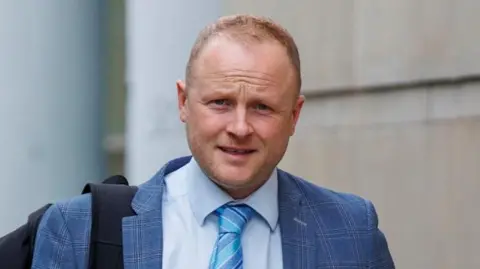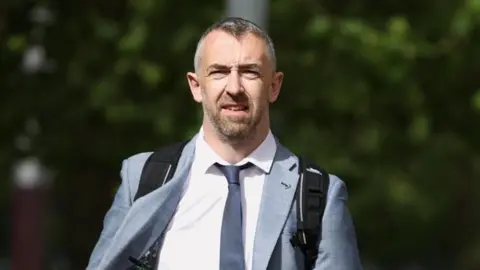What was the Nama trial?
 PA Media
PA MediaWhen loyalist Jamie Bryson and republican Daithí McKay sat beside each other in the dock at Belfast Crown Court for the first time, the courtroom briefly fell silent.
The two men from opposite ends of the political spectrum were now only inches apart.
The well-known loyalist and the former high-profile Sinn Féin politician nodded at each other.
They then faced forward towards the judge, Gordon Kerr KC, as their trial began, in the middle of May this year.
Throughout their lives, Mr Bryson and Mr McKay had been on different sides but now they had the same aim – to prove their innocence.
What were the allegations against Bryson and McKay?
It was alleged they were involved in a conspiracy to manipulate how evidence was presented to a Stormont committee.
It may seem like a plot from the TV sitcom Give My Head Peace - a loyalist and a prominent 'Shinner' working together in secret and breaking the law – but that is the allegation they faced.
On the first day of the trial, prosecution barrister Toby Hedworth KC set out what they were accused of doing.
He said they tried "to subvert the rules of procedure of Stormont's Finance Committee for the purpose of seeking to cause considerable political embarrassment to the then first minister [Peter Robinson] and others".
The barrister added: "One of its proponents was the chair of the committee himself [Daithí McKay], no doubt enjoying the opportunity for point scoring against a political rival."
 PA Media
PA MediaThe case at Belfast Crown Court dated back to events which happened almost 10 years previously.
As chair of the committee, Mr McKay was in a key position when Mr Bryson offered to give evidence to one of its hearings.
A year after the hearing, the Irish News reported that Mr McKay had secretly "coached" Mr Bryson about how to present his evidence.
If true, was this a criminal act? Or simply political?
In many ways, that was the central question in the four-week trial.
The prosecution insisted what happened was not "part of the rough and tumble of politics".
They argued that rules of procedure had been breached, and potentially a police inquiry was put at risk.
Mr McKay was accused of misconduct in public office. Mr Bryson faced a conspiracy charge related to the alleged misconduct.
A third man, Thomas O'Hara, a Sinn Féin member and friend of Mr McKay, was also in the dock. He too faced a conspiracy charge.
He was alleged to be a link between Mr Bryson and Mr McKay, relaying information ahead of the committee hearing on 23 September 2015.
The committee was investigating the Northern Ireland property portfolio of the National Assets Management Agency (Nama).
Committee concerns
Although Mr Bryson offered to give evidence, there was nervousness among committee members about what he might say.
Concerns were raised about him making allegations without evidence, and whether his remarks might impinge upon an ongoing investigation by the National Crime Agency.
The committee debated whether it would be better to hear Mr Bryson in private.
The prosecution said a series of private messages exchanged on Twitter showed that Mr Bryson was guided by Mr McKay and Mr O'Hara about how to ensure his evidence could be heard in public.
At one point, Mr Bryson was alleged to have written: "Who would ever have thought it, me and SF working together as the DUP squirm! Unreal!"
During his appearance at the committee, Mr Bryson made an allegation about Mr Robinson, which the then Democratic Unionist Party (DUP) leader later denied and described as "scurrilous".
While the high-profile loyalist has remained a prominent figure in the subsequent 10 years, Mr McKay has slipped from the public eye.
He quit the assembly after the claims were made about secret contacts with Mr Bryson.
A TV drama?
A police investigation began and, eventually, the case ended up in court.
Mr Bryson admitted being involved in text exchanges but insisted there was no conspiracy, no agreed plan and therefore no criminality. It was political not criminal activity, he insisted.
Mr O'Hara admitted involvement in the exchanges but said he was just a go-between, and was "used" by Mr McKay to pass on messages from him.
As for Mr McKay, he chose not to give evidence in the trial.
All three men denied the charges against them.
It was a long and complex case.
Some of the events may have seemed like something from a fictional script, but this was reality.
It involved Stormont, social media, the police, the courts and two well-known political figures.
It is a story that could, after all, end up being retold in a TV drama one day.
